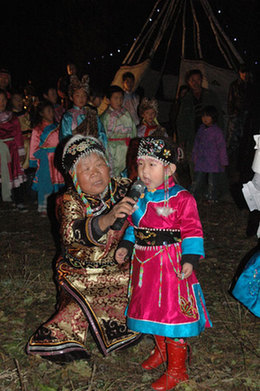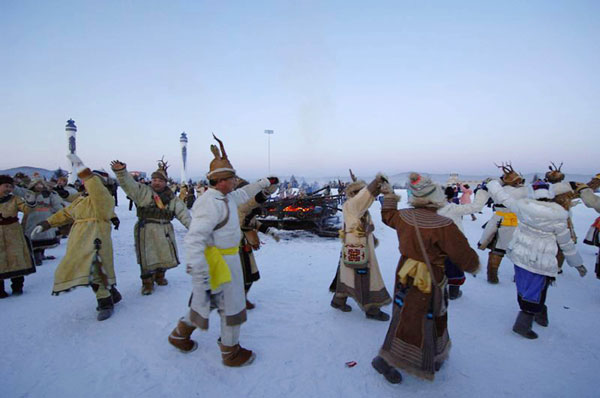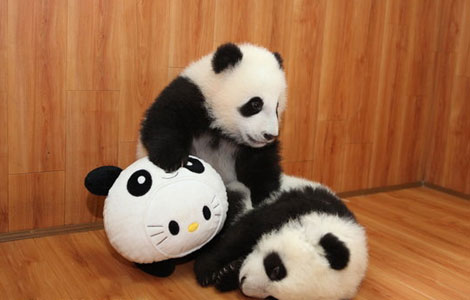|
|||||||||
Oroqen ethnic group in race against time to safeguard traditions, Li Yao reports in Heilongjiang.
Mo Guizhen was 5 when she saw a real bed for the first time. She refused to sleep on it, accustomed as she was to deer furs laid on the ground of hunters' huts in the depths of the Greater Hinggan Mountains in northeastern China.
|
 |
|
Mo Guizhen teaches a little girl to sing Oroqen folk song at a local festival. Mo, 63, and friends mostly in her age group are collecting the songs of hunters and writing down their folklore. [Photos by Teng Jun / for China Daily] |
Nearly six decades later there are more than 8,000 Oroqen people, but Mo feels nervous about their future. "We are losing our culture. My childhood stories sound like fairy tales to young Oroqens."
Hunting was at the core of their culture. Oroqens - "people using reindeer" - were fierce hunters who wore animal furs and skins and lived in huts covered with birch bark. Their ancestors were recorded as early as in the 4th century. They have their language, though no written script, and their shamans.
Oroqens are mainly farmers today. Mo and her friends are busily collecting the songs of hunters, writing down their folklore and teaching the language to whoever wants to learn.
"Old people are living fossils of the Oroqen culture," she said. "Time is running out."
'No ordinary fish'Mo remembers moving frequently as her father led clan members on hunting expeditions. Women usually stayed behind to dry meat, prepare food and take care of the elderly and the children.
Setting up their shelters beside rivers, the Oroqens were excellent fishers. "Once my mother fished out a giant fish that fed us for a week," she said. "But she was too frightened to take a single bite. She suspected the creature with big open eyes was no ordinary fish but a dragon."
Mo, now 63, remains mystified by many shaman practices pertaining to the hunting life.
When children became impatient for the hunters' return, Mo's mother would ask a "goddess" by making a simple wooden frame that roughly resembled a person's shape. Two women pulled threads tied to the edges to make the "goddess" dance and respond to questions about the hunters' return two or three days later.
"The goddess leaned forward when my mother said 'three', and it indeed happened so," she said.
In the summer of 1952, the river Mo's family lived beside flooded and sent their birchbark boat downstream. Her mother and aunt gathered the children, knelt and kowtowed to the drifting boat, praying that a merciful god not take it away and leave them to starve.
"No matter how devoutly we prayed, the boat disappeared," Mo said, amused.
|
 |
|
An Oroqen hunter is ready for a trip into the depths of the forest. The ethnic group in Northeast China is trying to preserve its traditions. [Lu Tao / for China Daily] |
Mo was 9 and already a fine horseback rider when she joined her extended family on their last group hunt in 1957. She enjoyed catching fish without a hook and had unusual playmates, such as a wounded baby sable.
"I fell into running water twice while crossing rivers," she said. "Both times my father risked his life and saved me. He used to be the head of our clan and an excellent hunter."
In retrospect, Mo believes that being constantly on the move and chasing wild beasts ruined the hunters' health and caused untimely deaths.
"Hunters caught cold easily after stalking deer in winter for days. Many later suffered from coronary diseases and emphysema after a lifetime in harsh surroundings." Mo's husband was 48 when he died of illness in 1993.
Her mother gave birth to eight children. The first had a disabled leg and died within months. The third lived only hours in the cold winter.
Mo's mother died in 1984, at 63. "She looked so old and worn out when she left because of all the hardships she had suffered."
Lifestyle transitions
Mo and her siblings kicked and screamed to protest sleeping in the bed when they first moved downhill. Until 1958, a few stubborn seniors preferred traditional shelters in the courtyard to the brick and tile housing.
"When people sat around a fire in a makeshift shelter, they may have felt warm on the front but it was icy cold on their back. We have no more such hardships in a brick house today," Mo said.
Since their resettlement, Oroqens are provided free housing, subsidized healthcare and education. They live mainly by farming.
In the 1990s, hunting was banned for most of the year to protect the declining number of forest animals. Government authorities collected hunters' shotguns and redistribute them to be used for about a month every winter.
Hound dogs are still a common sight in people's courtyards. But they are quiet, most sleepy and unresponsive to strangers' curious faces and noises.
"Nothing stirs them up except when they see men prepare horses to go hunting," Mo said. "But that excitement comes rather rarely for them."
|
 |
|
Dancing is part of the tradition of the Oroqens, along with making clothes from animal skin and furs. They are the "people using reindeer". [Photos by Teng Jun / for China Daily] |
Hot Topics
HIV/AIDS, Egypt protest, Thanksgiving, climate change, global economic recovery, home prices, high-speed railways, school bus safety, Libya situation, Weekly photos
Editor's Picks

|

|

|

|

|

|






